#middle high german
Text
Dear means 'valued; precious; beloved'. However, in certain expressions it also means 'expensive', such as in to cost dear. This meaning, inherited from Proto-Germanic, became dominant in cognates of dear, such as Dutch duur, German teuer, and Swedish dyr. The infographic tells you the whole story.
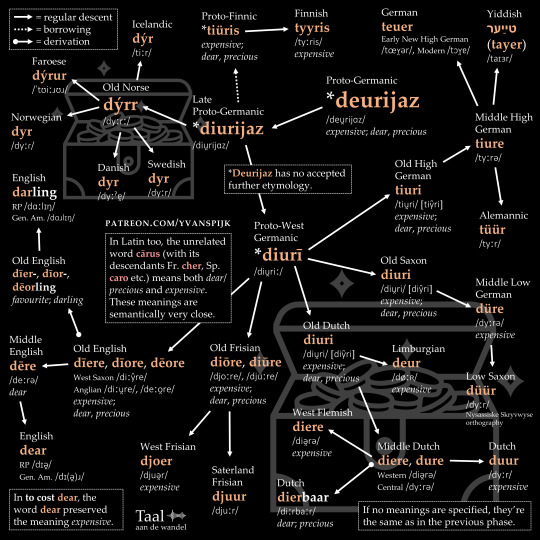
#historical linguistics#linguistics#language#etymology#english#dutch#german#low saxon#frisian#old frisian#old saxon#old high german#old english#old dutch#middle high german#middle dutch#middle english#middle low german#lingblr#proto-germanic#proto-west germanic#yiddish#west flemish#limburgian#saterland frisian#faroese#icelandic#norwegian#swedish#danish
138 notes
·
View notes
Note
Hiii I finally found enough time to read the new chapter of At Thy Will and it was perfect!! I left a comment but also want to tell you over here cause I'm just way too excited about this story 😁 Thanks for writing it! ❤️
you're so sweet, thanks a lot! I enjoy writing aus so much, and this one just has so much angst potential (but then again, I am literally incapable of writing something without angst, so that might also just be me). I think I said before that At Thy Will is inspired by marriage laws of medieval Europe (specifically the areas that later become Germany) and they just make me mad, so sometimes you gotta write angsty fanfic inspired by your class in medieval German (which is a very fascinating language, actually. I can very much recommend).
Anyway, you're not here to listen to me ramble about the history of the German language. I can promise there will be pining and more angst, possibly an ally or two if I'm feeling generous...xD maybe someone gets to punch Jonah in the face...
#ask#my writing#tma fanfic#jmart#jonmartin#jonathan sims#martin blackwood#medieval marriage laws#middle high german
9 notes
·
View notes
Text
started reading Parzival by Wolfram von Eschenbach (early 13th century) and I find it very funny how in (german) medieval literature (including the norse hero sagas in the eddas, and the volsungs saga) the heros are always "yes he was so beautiful and perfect and everyone loved him and he was so strong and never failed at anything, and people threw their money at him because he was so great"
when today we call that a gary stue, and dismiss heros like that
are there any medievalists that can talk about this? is there a reason behind the perfect hero? or was that just the trend?
#personal#medievalist#medieval literature#medieval poetry#parzival#middle high german#middle high german literature#wolfram von eschenbach
45 notes
·
View notes
Text
Reichston
by Walther von der Vogelweide
Ich saz ûf eime steine
und dahte bein mit beine,
dar ûf satzt ich den ellenbogen;
ich hete in mîne hant gesmogen
mîn kinne und ein mîn wange.
dô dâhte ich mir vil ange,
wes man zer welte solte leben;
deheinen rât kunde ich gegeben,
wie man driu dinc erwurbe,
der deheinez niht verdurbe.
Ich saß auf einem Steine
und deckte Bein mit Beine,
darauf der Ellenbogen stand;
es schmiegte sich in meine Hand
das Kinn und eine Wange.
Da dachte ich sorglich lange,
dem Weltlauf nach und irdischem Heil;
doch wurde mir kein Rat zuteil,
wie man drei Ding’ erwürbe,
dass ihrer keins verdürbe.
I was sitting on a stone
And covered leg with leg,
I placed the elbow on top of it;
It nestled into my hand
The chin and one of my cheeks.
This way, I thought long and thoroughly
About the way you should live in the world;
But I was not given any advice
How to obtain three things
In a way that none of them will be tainted.
diu zwei sind êre und varnde guot,
daz dicke ein ander schaden tuot;
das dritte ist gotes hulde,
der zweier übergulde.
die wolte ich gerne in einen schrîn.
jâ leider, des enmac niht sîn,
daz guot und weltlîch êre
und gotes hulde mêre
zesamene in ein herze komen.
stîge und wege sint in benomen;
Zwei Ding’ sind Ehr’ und zeitlich Gut,
das oft einander Schaden tut,
das dritte Gottes Segen,
den beiden überlegen.
Die hätt ich gern in einem Schrein.
Doch mag es leider nimmer sein,
dass Gottes Gnade kehre
mit Reichtum und mit Ehre
zusammen ein ins gleiche Herz.
Sie finden Hemmungen allerwärts;
Two things are honesty and wealth
That often harm each other,
The third is God's blessing,
Superior above the former two.
I would like to have them in a shrine.
But unfortunately it may never happen
That God's grace woluld come
Together with wealth and with honor
Together in the same heart.
They will find many restraints;
untriuwe ist in der sâze,
gewalt vert ûf der strâze,
fride unde reht sint sêre wunt.
diu driu enhabent geleites niht,
diu zwei enwerden ê gesunt.
Untreue liegt im Hinterhalt,
kein Weg ist sicher vor Gewalt,
so Fried als Recht sind todeswund,
und werden die nicht erst gesund,
wird den drei Dingen kein Geleite kund.
Unfaithfulness lies in ambush,
No road is safe from violence
Peace and justice have almost perished,
And until they don't get healthy again
there is no guide to the three things.
27 notes
·
View notes
Text
thinking about the medieval German retelling of the life of Alexander the Great and how after he conquered the whole world he was like "hey I heard there's the garden of eden like right east of India and i was thinking why actually are we not conquering it so the angels pay their toll to me like they should be right???" and all the wise people are like "no" but all the dumb people are like "YES"
so they go all the way there and knock on the door to paradise and no one inside gives a shit until some old guy comes out like "who this" and everyone is like "alexander the great! king and conqueror of the whole world!!"
and the guy is like "??? who" and then he says he has to ask the others about this and closes the door on alex's nose
and after some time he comes back and is like "you're being stupid but here take this stone it'll teach you a lesson" and closes the door on him again
so then it's some kind of riddle and scholars are disputing to this day what the stone actually means because it's heavier than gold but lighter than a feather and its something something greed something something and alexander changes his life around and helps the poor and stops conquering etc etc
and it ends and this being a funny tale and all but it ends with a passage that stuck with me
"Niwit mêr er behilt / allis, des er ie beranc / wene erden siben vôze lanc, / alse der armiste man, / der in die welt ie bequam."
"Nothing more he kept, of everything that he had conquered, but seven feet of earth, just as the poorest man that ever lived in the world."
it struck me the same as when I heard my mom say some time ago: "Letzte Hemd hat keine Taschen" – the last shirt has no pockets.
(also right before that passage it says "he ruled for 12 years, then he was poisoned. That's why he couldn't stay alive, because his head exploded")
#middle high german#mittelhochdeutsch#medieval literature#middle ages#literature#alexander the great#history
3 notes
·
View notes
Text
monsters, creatures and wild people in Heinrich von Neustadt: ‚Apollonius von Tyrland’ (1465/1467)




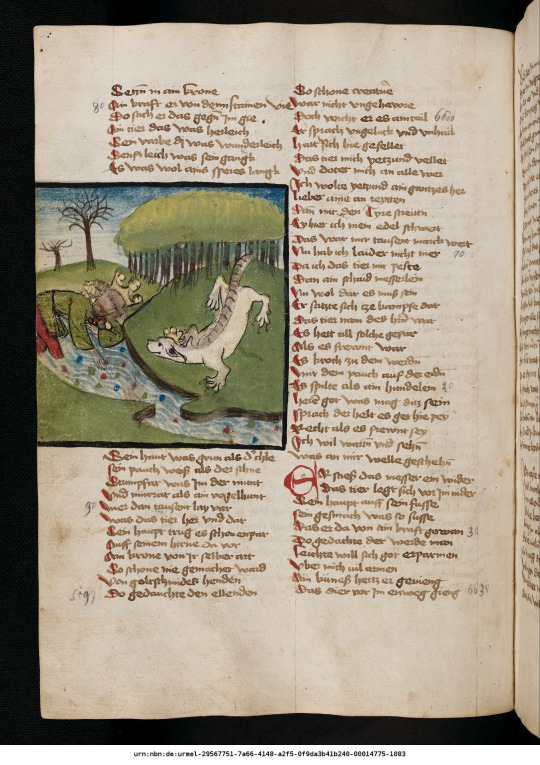
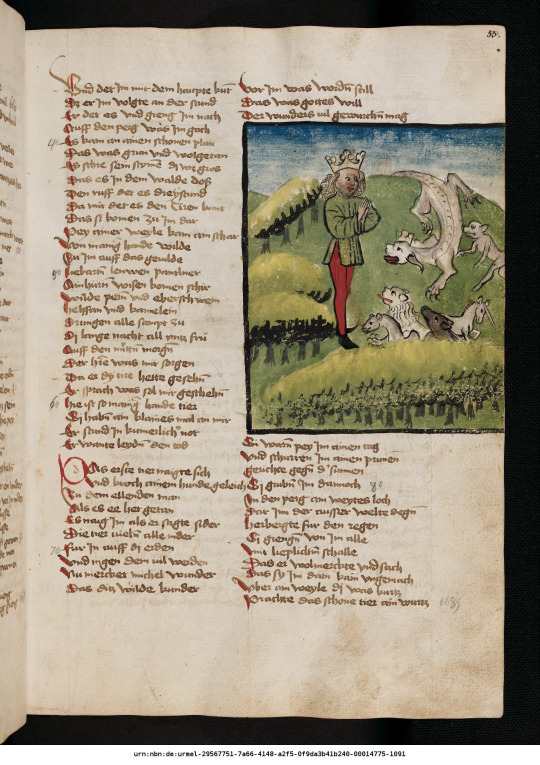
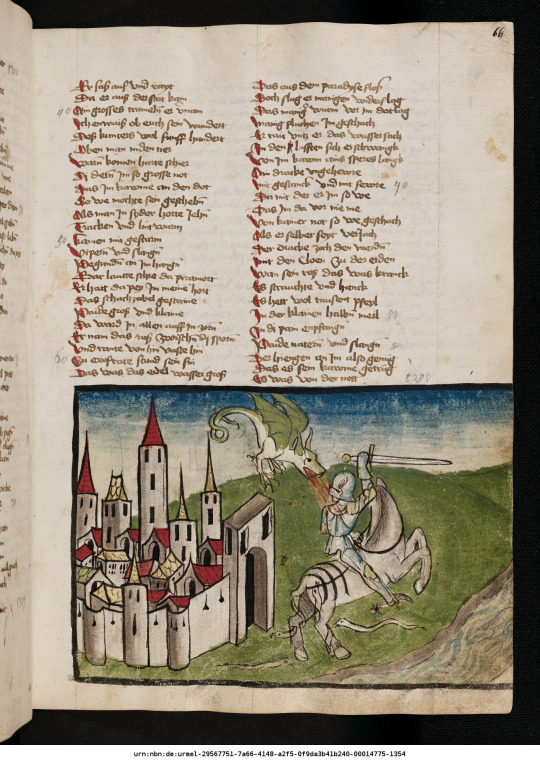
#medieval art#illuminated manuscript#medieval manuscript#middle ages#middle high german#medieval literatur#apollonius
4 notes
·
View notes
Text
I am learning Middle-High-German under my own steam and it is bliss!!! 🤩😍😊💜
I love it so much, I knew there was a reason to drag myself forward from day to day! 😉 Honestly it's so beautiful and I have a feeling that I will use it more in everyday conversations once I speak and understand it better. It's just so infinitely more appealing than current degenerating language use. What a magical thing to learn, so familiar and yet so exquisite and new. :) I just had to say this. Carry on, dearest folk!

1 note
·
View note
Text
Carmina Burana - Wikipedia
#Carmina Burana#Benediktbeuern#medieval poetry#dramatic texts#Medieval Latin#Middle High German#Arpitan#macaronic
0 notes
Text
youtube
0 notes
Text
Slides an email across the table to the German/Nordic/Slavic/Dutch department to ask if I can take 4th semester German in the fall even though I tested into 3rd semester German, because the former fits into my schedule perfectly and I would have to take the latter at the god-forsaken hour of 8am.
#my commute takes half an hour at least and i have POTS. i would die#(also if i pass 4th semester german in the fall i could take MIDDLE HIGH GERMAN next spring)#(but my primary motivation here is not dying)
54 notes
·
View notes
Text

The word Lent, which denotes the Christian abstention period of 40 days preceding Easter, used to be the default word for springtime. Its Dutch cognate lente still is the word for 'spring', while German Lenz is now archaic. They all come from a word meaning 'long-day'.
#historical linguistics#linguistics#language#etymology#english#dutch#german#old high german#middle high german#middle dutch#old dutch#low saxon#old saxon#middle low german#middle english#old english#proto-germanic#proto-west germanic#lingblr
97 notes
·
View notes
Text

Folio 124 recto (Herr Walther von der Vogelweide), Codex Manesse
#manuscript#illuminated manuscript#codex manesse#liederhandschrift#poetry book#c: german#y: 1300s#l: middle high german#t: page#I RETURN. sorry for the extended silence i got stuck in a labyrinth that i had to wander in contemplation
86 notes
·
View notes
Note
hi. could you recommend medieval literature? thank you :)
uuh, yes i can but that really depends on the fact if you can understand german! i dont know if there are english translations of it (i read them in dual language editions, with middle high german and new high german) - i only have read one book that is not german
But in case you can, here are the ones i read in the past year (the not german one is the last one):
Collection of poems by Walther von der Vogelweide - one of the most famous german speaking minnesänger, lived from 1170 - 1230, and has stolen my heart with his diss tracks to the pope; author of the Famous 'Palästinalied' written as propaganda during the crusades
Collection of poems by Neidhart von Reuental - another important german speaking minnesänger, born around 1180/90, so a younger contemporary of Walther, sings a lot about the 'stupid peasants' and how they try to emulate life of the nobles (great fun, the peasants hated him); the Neidhart persona was very self depricating, depticting an unlucky knight; my favourite song of his is 'Meie din liechter schin'
Der Ackermann by Johannes von Tepl - probably one of my absolute favourite books ever, written in the early 15th century as a story for a friend of Johannes von Tepl, who himself was an educated man from northern bohemia; technically already early new high german and not middle high german; the story is a dialogue between a man and death - the mans wife has just died and he starts insulting death, demanding to bring her back. it goes back and forth, and they discuss life, death, humanity creation, god and grief. i loved it
Ein kurtzweilig Lesen von Dil Ulenspiegel - written around 1515 by an anonymous author in early new low german; german speaking people are more familiar with the modern name Til Eulenspiegel. I grew up with the modern adaptations of the story, but the late medieval ones are so, so much more crude. it is a collection of short stories, telling the tale of Dil Ulenspiegel, a silly boy/young man who does silly things. a medieval comedy, nothing profound. the original print has nice wood cut illustrations. it was widely popular, because medieval people could read (although they couldn't necessarily write)
Parzival by Wolfram von Eschenbach - written around 1200-1210 in southern germany, picks up athurian legend. i am half way through and have personal beef with wolfram. but it is good, a lot of depictions of noble life and medieval morals and ideas. makes A LOT of references to other writers of the time, including Walther von der Vogelweide, Gottfried von Straßburg (see next book) and Hartmann von Aue (see below)
Tristan by Gottfriend von Straßburg - written around 1210, is the german adaptation of the tale of Tristan and Isolde. I have not read it yet, but the books are on my shelf to be read as soon as I am done with Parzival
Erec by Hartmann von Aue - written around 1180/90 is said to be the first arthurian story written in german and an adaptation of the old french Erec et Enide - same as above have not read it yet
Iwein by Hartmann von Aue - second arthurian story, written around 1200, also adaptation of the old french story - same as above i have to still read it
The tale of the two lovers by Aeneas Sylvius Piccolomini (future Pope Pius II) - written in latin (there are english translations!) in the mid 15th century for a friend while at the court of Vienna, this is the most famous medieval erotic novel we have! It is about a married woman falling in love with one of the holy roman emperors men while they visit the town in italy she lives in, and the spicy affair they end up having, probably based on a similar story that happened. Aeneas lived a wild life and was old beyond his age, having 2 kids with two different women in two different countries out of wedlock and being a well travelled poet. he also hated women, like, A LOT. after he became pope he wanted to supress the circulation of the book, but is was a best-seller so it didnt work evidently, as i have read it in the 21st century
In addition to that, as a historical fencer I also read the sources, but these will be boring to people who dont care, but here are some anyways:
The Art of Swordsmanship by Hans Lecküchner - most famous source for Langes Messer techniques
Das Fechtbuch by Albrecht Dürer - yes, THE Dürer wrote a fencing book, completely in verse with nice illustrations!
Jude Lew - his fencing manuals are also nice, no illustrations only text
Hope this helps in a way.. again, i read mostly german medieval literature, so idk if this is useful as idk if any of these books have been translated
#personal#medieval literature#middle high german#medieval studies#any real medievalists could add something that is more useful#i am just a hobbyist reenactor
11 notes
·
View notes
Text
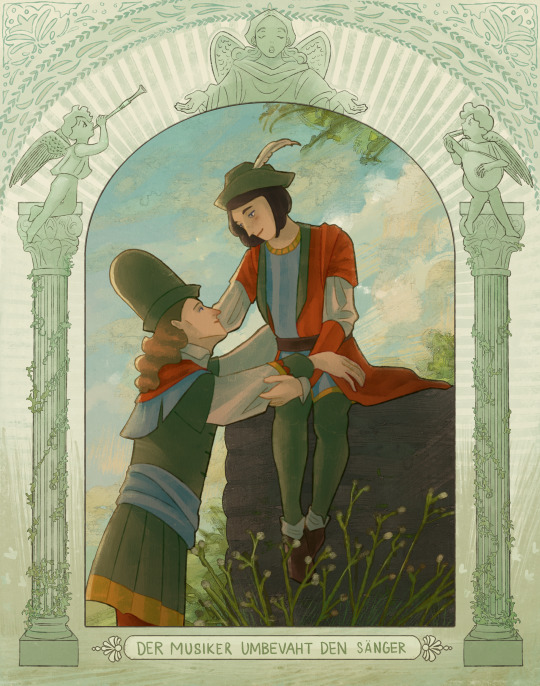
practice piece w/ the boys (reference+frameless below)
refed Christ Embracing St. Bernard by Francesco Ribalta but i dont have the cunty baroque colouring style. thats also where the inscription below the frame comes from.
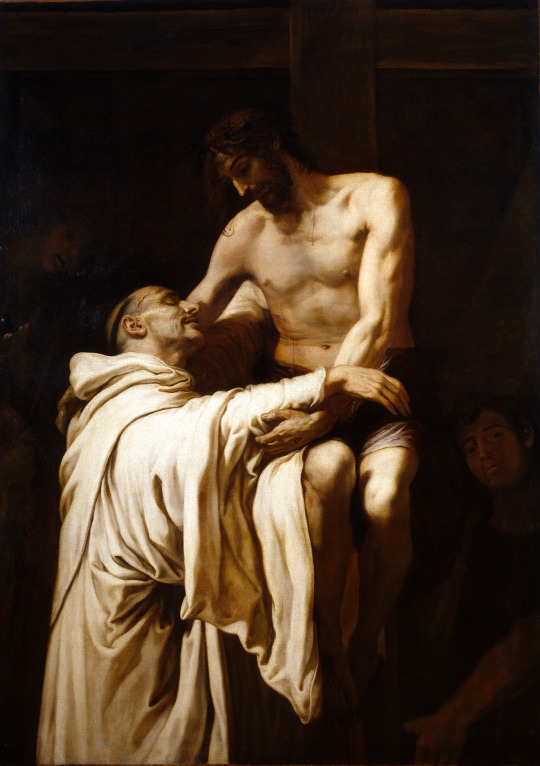

#pentiment#alexander rappolt#kazimierz wierzbięta#i wanted to practice making a nice frame but then i gave up after a while#couldve drawn more bas relief lookin stuff up top but then the shawm was throwing off my symmetry lmao#idk i think i give up tryna work on frames lmao ill just vibe and get good at composition instead#oh also what the fuck i cant find resources for middle high german lmfao??? no comprehensive dictionary online cringe????#idk how accurate that translation is if ur german just close ur eyes and feel my vibes#my tags are fucking paragraphs im so sorry if u opened this lol#my art
61 notes
·
View notes
Text
I’m at a point in learning German where it doesn’t feel super hard what my problem is with the class is the people in my class
THEY TALK SOMUCH WE NEVER GET ANYTHING DONE
#I’m on my like 5th year of German#I took 3 years in middle school#and I’m on my 2nd year in high school#probably going to take it thro the rest of HS too#marceline talks
30 notes
·
View notes
Text
monsters, creatures and wild people in Heinrich von Neustadt: ‚Apollonius von Tyrland’ (1465/1467) - part 2


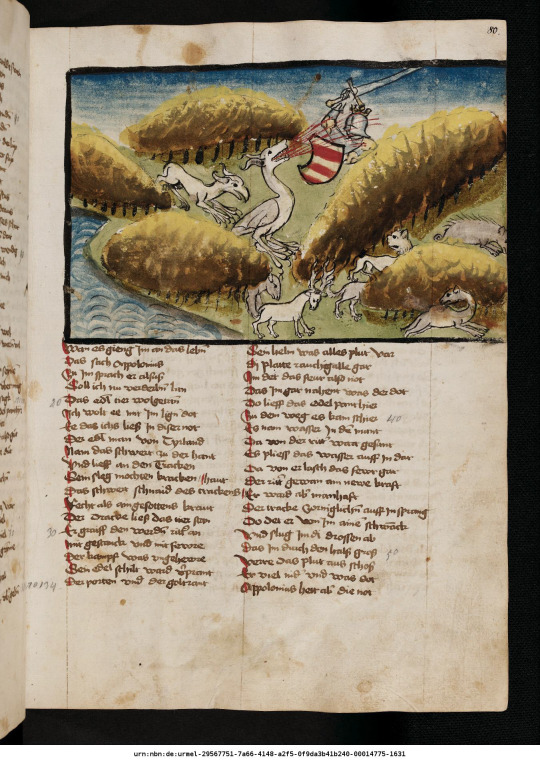
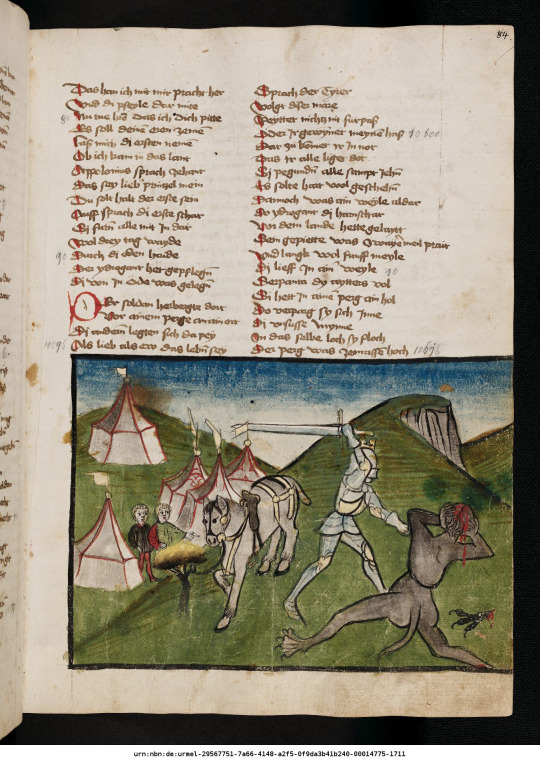

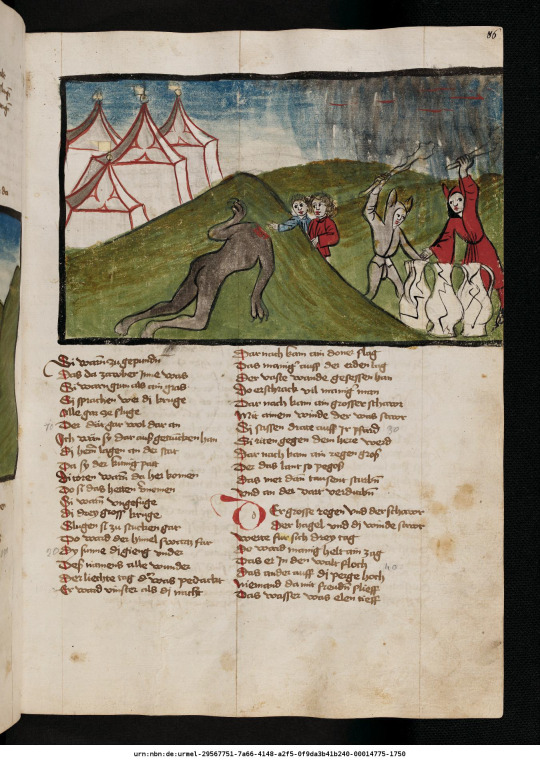
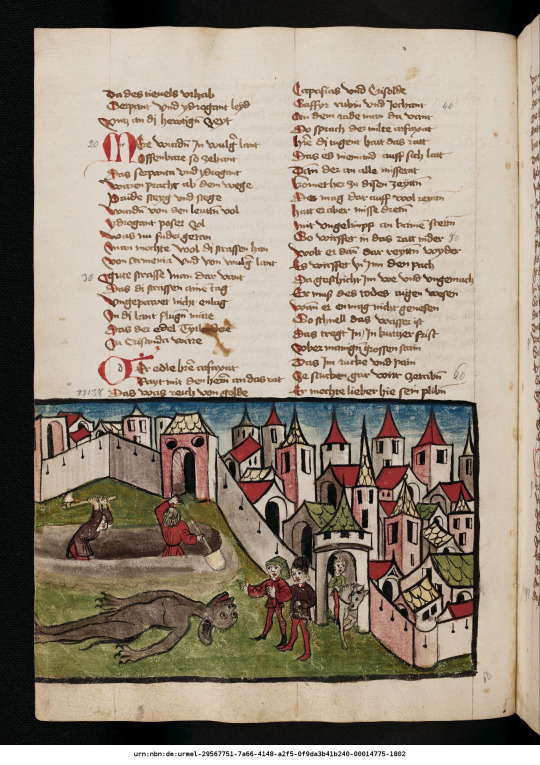
#medieval art#illuminated manuscript#medieval manuscript#middle ages#middle high german#medieval literature#history#apollonius
0 notes